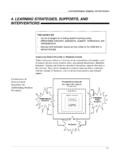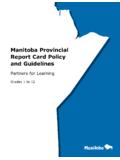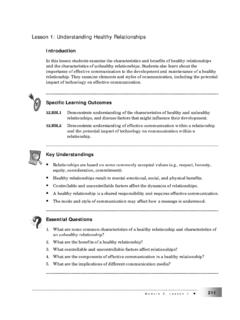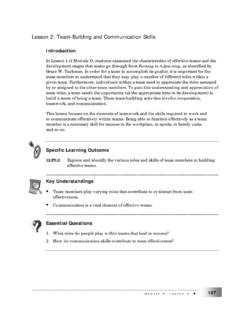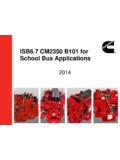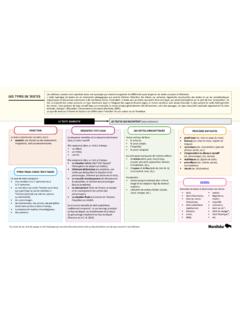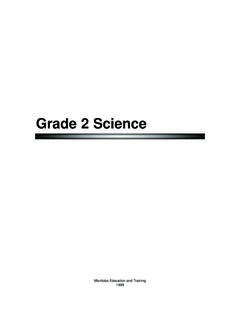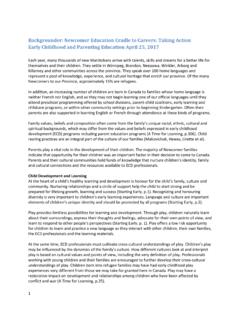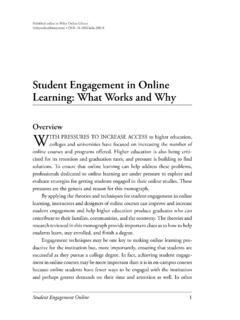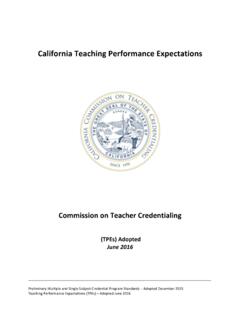Transcription of Impact of Information and Communication Technology …
1 Impact of Information and Communication Technology (ICT) on Student learning and Achievement [Current] graduates began their school career being taught the literacies of paper, pencil, and book technologies. Many will finish their secondary school careers familiar with the new literacies demanded by a wide variety of ICTs: wikis, blogs, avatars, podcasts, mobile technologies, and many others unimagined at the beginning of their schooling (IRA, 2009) General Observations Although action research reveals that ICTs can empower teachers and learners, provide a learning environment that helps address different learning styles, and foster the development of 21st century skills , current peer reviewed studies to support these beliefs are still limited. Much of the literature dates from 2005 or earlier, which is a number of generations in Technology years.
2 At that time, data was often obtained by testing students computer skills, or by measuring changes in their achievement after using specific computer-assisted learning applications. Due to the short shelf life of studies related to the Impact of ICT on student achievement and engagement, this analysis examines mainly studies published in the last five years and is based on the following two caveats. ICTs should not be seen as the focus of the learning process ICTs are generally not, and should not be considered, the focus of the teaching and learning process. Manitoba s Literacy with ICT (LwICT) model encourages infusion of ICT in teachers instruction and in students learning , whereby ICTs are not the focus of learning , but rather are supportive of critical, creative, and ethical thinking. Many peer-reviewed studies focus specifically on certain types and titles of instructional software.
3 This focus is too narrow to give a generalize-able view of the use of ICT to support and enhance learning and engagement across the curriculum. Pedagogy must be put ahead of ICT One of the ongoing challenges of Technology use in education is that, until recently, educational leaders and Technology advocates thought of ICTs first and investigated the pedagogical component only later. There are still only a limited number of peer-reviewed studies which avoid this pitfall. Over a dozen research studies and meta-analyses (see references) were reviewed in order to answer the following two guiding questions. Guiding Questions: 1. What do we know about the Impact of ICTs on student learning and achievement? 2. What do we know about the Impact of ICTs on student motivation and engagement in learning ? Impact on student achievement 1.
4 The Impact of ICT use in education has been difficult to measure quantitatively In general, and despite thousands of research studies, most of those conducted before 2005, the Impact of ICT use on student achievement has remained difficult to measure. Now that ICT is used more and more in classrooms as a means to access Information , support learning and communicate understanding (Literacy with ICT) rather than as a tool to be learned (ICT Literacy), research looking at student achievement seems to have become more qualitative-based. Measuring ICT Impact against students attainment and improvement of their basic skills is one way of assessing Impact assessment, but one which assumes a fixed education system in which school learning is primarily about mastering of a pre-determined body of knowledge, skills and understanding.
5 (Balanskat, 2006) ..most reputable educational researchers today would agree that there will never be a direct link, because learning is mediated through the learning environment and ICT is only one element of that environment. (Newhouse, 2002) 2. The Impact of ICT on student achievement is more positive when linked to pedagogy Research has described how ICTs can have positive effects on student achievement when used appropriately to complement a teacher s existing pedagogical approaches.. Technology interacts with many variables: student preparation and motivation, how the student or instructor uses technolog, and how well the environment supports Instead of asking what Impact Technology has on student learning , ask how you can incorporate the best-known principles about teaching and learning , using Technology as a tool for innovation.
6 (Spurlin, 2006) 3. Acquisition of competencies such as critical thinking and collaboration are also considered a positive Impact of ICT In Manitoba, the Literacy with ICT Developmental Continuum links ICT to pedagogy by focusing on Inquiry across the curriculum. ICT is infused into inquiry where critical and creative thinking is supported through the ethical and responsible use of ICT. Individuals, groups and societies who can identify the most important problems, locate useful Information the fastest, critically evaluate Information most effectively, synthesize Information most appropriately to develop the best solutions and then communicate these solutions to others most clearly will succeed in the challenging times that await us. (Leu et al, 2011) Technology has been shown to positively influence student learning when students explore Technology -rich tasks that simultaneously require them to use higher-order thinking skills (HOTS), such as analyzing or evaluating Information or creating new representations of knowledge.
7 (Polly, 2011) Most of the reviewed studies show that ICT impacts on competency development specifically team work, independent learning and higher order thinking skills that are not yet recognised by many education systems (Balanskat, 2006) 4. ICT Impact is dependent upon the type of pedagogies used Transmission-type teacher-centred pedagogies are sometimes seen as more efficient than more constructivist student-centred pedagogical styles, likely because their level of effectiveness may be more easily measured. Conversely, the use of ICT for teaching and learning is seen to be most effective when employed as part of a student-centred approach, which by nature is more difficult to measure. Factors that impede the successful implementation of ICT in teaching [include] .. teachers poor ICT competence, low motivation and lack of confidence in using new technologies in teaching [which] are significant determinants of their levels of engagement in ICT [and reveal that such] teachers practice is not changing much when they use ICT.
8 What is the likely scenario when e-confident children become frustrated in e-immature schools? (Balanskat, 2006) 5. Disconnect between use of ICT for learning and assessment of ICT Impact The connection between the use of ICT and the achievement of students is only valid when the means of measurement is congruent with the means of teaching and learning . In some studies there is a mismatch between the methods used to assess the effects of ICT on student achievement and on how ICT is actually used in the classroom. For example, some studies have looked only for improvements in traditional teaching and learning processes, and in mastery of knowledge, instead of looking for the new processes and higher order thinking skills related to the infusion of ICTs. Students who use ICTs often and regularly in their learning , but are evaluated using traditional methods such as pen and paper, may show little to no significant improvement in their achievement because they are not able, in the testing situation, to use the ICT-infused strategies they have become comfortable and successful with.
9 Current education systems hinder ICT Impact and, correspondingly, Impact studies and evaluations often measure against traditional systems. Are researchers looking at the wrong outcomes? And are policy-makers clear or realistic about what they expect the results of ICT investment to be? (Balanskat, 2006) 6. ICTs have a positive Impact on student achievement in blended - learning situations Classrooms are considered face-to-face learning environments, but classroom learning can be supplemented with the use of ICTs such as web-based courses and other online technologies. This is considered a blended learning situation. Classes with online learning , whether completely online or blended , on average produce stronger learning outcomes than learning face-to-face alone. (Underwood, 2009) In recent experimental and quasi-experimental studies contrasting blends of online and face-to-face instruction with conventional face-to-face classes, blended instruction has been more effective, providing a rationale for the effort required to design and implement blended approaches.
10 ( Dept. of Education, 2009) 7. Learners believe that ICTs make a positive difference in their learning In studies that rely largely on self-reporting, most students feel that using ICTs makes them more effective learners. This may be due to the satisfaction felt by students when they use tools with which they are comfortable..students see the use of relevancy-based digital tools, content and resources as a key to driving learning productivity, not just about engaging students in learning (Speak Up, 2009) Impact on student motivation and engagement 1. ICTs motivate both teachers and students There appears to be some consensus that both teachers and students feel ICT use greatly contributes to student motivation for and engagement in learning . A very high 86% of teachers in Europe state that pupils are more motivated and attentive when computers and the Internet are used in ICT has a strong motivational effect and positive effects on behaviour, Communication and process skills.
